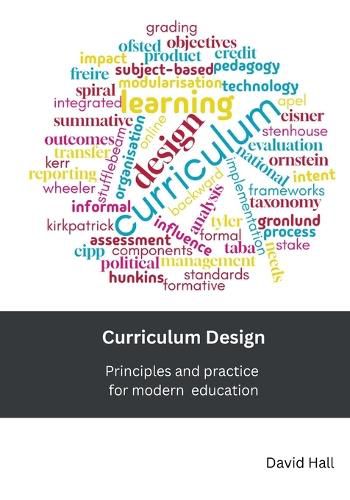Readings Newsletter
Become a Readings Member to make your shopping experience even easier.
Sign in or sign up for free!
You’re not far away from qualifying for FREE standard shipping within Australia
You’ve qualified for FREE standard shipping within Australia
The cart is loading…






This title is printed to order. This book may have been self-published. If so, we cannot guarantee the quality of the content. In the main most books will have gone through the editing process however some may not. We therefore suggest that you be aware of this before ordering this book. If in doubt check either the author or publisher’s details as we are unable to accept any returns unless they are faulty. Please contact us if you have any questions.
The landscape of education is in a period of profound transformation - a fact that makes the challenges and opportunities of curriculum design more relevant than ever. In an age marked by rapid technological advancement, shifting societal needs, and increasingly complex policy demands, educators must be prepared not only to deliver quality content but to shape and lead dynamic learning experiences that meet the needs of diverse learners.
Curriculum Design: Principles and practice for modern education is written in direct response to these complexities and guides readers through the foundational theories that underpin curriculum design. With practical chapters devoted to effective curriculum implementation, evaluation methods, and innovation, the book equips educators with tools to critically assess both the internal and external influences - policy, research, and reflective practice - that shape today's educational programmes.
Beyond theory, the book addresses the "how" of curriculum: how leadership and collaborative practice drive curriculum change; how educators can create and adapt curricula for specific contexts; and how technology and research support continual improvement. By intentionally weaving together historical context, policy analysis, educational research, and practical reflection, this work provides a holistic approach essential for those aiming to develop high-quality, inclusive programmes.
Through discussion prompts, practical scenarios, and reflective activities, readers will deepen their understanding of curriculum as both an academic field and a pathway to meaningful educational transformation. Whether you are an aspiring curriculum leader, a practicing educator, or a policy maker, this book will support you in addressing contemporary educational challenges and improving the quality and relevance of curriculum in your own setting.
$9.00 standard shipping within Australia
FREE standard shipping within Australia for orders over $100.00
Express & International shipping calculated at checkout
This title is printed to order. This book may have been self-published. If so, we cannot guarantee the quality of the content. In the main most books will have gone through the editing process however some may not. We therefore suggest that you be aware of this before ordering this book. If in doubt check either the author or publisher’s details as we are unable to accept any returns unless they are faulty. Please contact us if you have any questions.
The landscape of education is in a period of profound transformation - a fact that makes the challenges and opportunities of curriculum design more relevant than ever. In an age marked by rapid technological advancement, shifting societal needs, and increasingly complex policy demands, educators must be prepared not only to deliver quality content but to shape and lead dynamic learning experiences that meet the needs of diverse learners.
Curriculum Design: Principles and practice for modern education is written in direct response to these complexities and guides readers through the foundational theories that underpin curriculum design. With practical chapters devoted to effective curriculum implementation, evaluation methods, and innovation, the book equips educators with tools to critically assess both the internal and external influences - policy, research, and reflective practice - that shape today's educational programmes.
Beyond theory, the book addresses the "how" of curriculum: how leadership and collaborative practice drive curriculum change; how educators can create and adapt curricula for specific contexts; and how technology and research support continual improvement. By intentionally weaving together historical context, policy analysis, educational research, and practical reflection, this work provides a holistic approach essential for those aiming to develop high-quality, inclusive programmes.
Through discussion prompts, practical scenarios, and reflective activities, readers will deepen their understanding of curriculum as both an academic field and a pathway to meaningful educational transformation. Whether you are an aspiring curriculum leader, a practicing educator, or a policy maker, this book will support you in addressing contemporary educational challenges and improving the quality and relevance of curriculum in your own setting.